Purchase on demand via interlibrary loan: Analysis of the first four years at University of Antwerp Library
Jennifer Van den Avijle and Luca Maggiore
Abstract
A library cannot and should not purchase every book ever published. It should however nurture a collection development policy guided by the needs of the patrons and environment in which it operates. Interlibrary loan offers patrons an affordable, easy and quick way to meet the most pressing needs where hiatuses in the collection are concerned. However, international loan requests for books can be costly and have a high delivery runtime with only a short lending period. Purchasing these titles rather than requesting them can turn out to be more cost- and time effective. In addition, adding requested titles to the collection is a sure way of developing the collection based on actual needs. The University of Antwerp Library implemented a Purchase on Demand pilot in 2018. This paper presents our findings after four years of POD-ILL as an additional acquisition model and partial alternative to international ILL. We provide a short introduction on the concept of POD-ILL and take a closer look at the collection purchased through POD-ILL. As expected, most purchases were made for the faculties of Law and Social Sciences and the departments of History and Literature. As an alternative to international ILL, the main benefit is the extended loan due to an owned versus lent copy. Our yearly budget was more than sufficient to cover the cost, which has provided some leeway in the purchase strategy and parameters. We have recently opted for inclusion of study books that are in high demand.
Keywords
Purchase on Demand; POD; Interlibrary loan; ILL; Demand-driven acquisition; DDA; University of Antwerp
Article
Purchase on Demand
Every library had its own collection development budget, strategies and goals. At the University of Antwerp, each faculty provides a collection development budget that is managed by the library department Acquisition and Metadata. Collection development decisions are made by the Faculty Library Advisor, on the advice of our E-info and Acquisitions library departments. Some faculties have a clear strategy and sufficient budget and develop their collection adequately. Some faculties have the budget, but no clear strategy and other faculties invest almost exclusively in research and therefore simply have no library budget, leaving students and researchers without recent and relevant literature, be it print or electronic.
Regardless of budget and strategies, the library collection can never satisfy all patron needs. Document delivery services and interlibrary loan offer affordable, easy and quick ways to fulfil the most pressing needs if certain items are not held in the collection. For articles and book chapters specifically, electronic document delivery is a very affordable and efficient alternative to purchase.
ILL of print items is an amazing service that makes collections all over the globe available. International ILL of print items however might not always be the best way to satisfy patrons’ urgent needs. It regularly takes a long processing and delivery time and the loan period is relatively short, even more so for research purposes (Chan, 2004, p. 27). The patron is often forced to copy or scan large parts of the book before returning it. International requests can be quite expensive. In many cases, the patron reimburses only a part of the delivery cost and the library has to further supplement the delivery fee.
This is where Purchase on Demand through Interlibrary Loan comes in. Instead of lending a requested book through ILL, the book is purchased from an online vendor with speedy delivery such as Amazon (Ward, 2002, p. 96). The book is catalogued and added to the collection before or after lending it to the requesting patron. In effect, it’s an additional acquisition model that doesn’t replace, but rather supplements the existing collection development strategies and offers an affordable alternative for international, expensive or slow ILL requests (Alder, 2007; Imamoto, 2016, p. 372; Zopfi-Jordan, 2008). By purchasing, the library is certain the acquisition is meeting a real need in the collection development. The library is also certain the book will be lent at least once, which can’t be said for other books selected for purchase through other collection development strategies (Ward, 2002, p. 96).
Implementing POD-ILL, proposal and discussion
Purchase on Demand is a well-known concept in the library world (Gee, 2014, pp. 134-135) and is even included as a feature in larger ILL systems (Foss, 2008, p. 307). The University of Antwerp library’s ILL system, Impala, which was developed in-house, does not, however, operate with an integrated POD module.[1] Furthermore, library collection budgets are provided and managed by the faculties themselves. All purchases on those budgets must be selected or approved by a Faculty Library Advisor, an academic staff member appointed by the faculty. A number of departments and faculties do invest sufficient time and budget in collection development, and standing orders often supplement the advisor’s selection. Quick and easy purchase of items requested and needed by patrons is however not encouraged by this financing and selecting method.
Based on a short literature review the Acquisitions and Metadata team manager wrote a proposal to implement POD-ILL as an alternative to the print ILL and supplemental acquisition model. The proposal was discussed on a department head meeting in 2018 and further tweaked after addressing some concerns.
Expected positive effects that were agreed upon during the discussion were:
- Fast accessibility through purchase via online vendors such as Amazon.
- Inclusion of relevant books otherwise not obtained though classical collection development methods.
- Demand-driven acquisition, providing patrons with what they want and need quickly without depending on Library Faculty Advisors overdeveloping their own field of research.
- Avoiding possibly high international ILL delivery costs.
- Extended loan due to inclusion in the library print collection.
Some concerns were also raised and discussed, such as:
- Not submitting all eligible POD-ILL requests, resulting in disproportionate acquisition.
- Purchase of niche works or titles with low usage (Tyler et al., 2010, pp. 162-163).
- Academic staff catching on to this new strategy, and overusing ILL request as an alternative to the classical collection development strategy and financing.
- Purchase of E-books was initially included, but with high costs and specific licensing issues we have not yet included them in our parameters. We have also excluded purchase of articles.
The library provided a yearly POD-ILL acquisition budget of 10,000 euros. The initial parameters to determine if a book was eligible for purchase are listed below, but could be altered during the project.
- Print books, only accessible via international ILL.
- Requests by University of Antwerp academic staff.
- Books supplementing the collection profile.
- Recently published.
- Maximum cost of 60 euros.
Workflow
There is no direct purchase module included in our ILL software Impala. To implement this, extensive development would be required, but the return on investment for this development is considered too limited. So to start POD-ILL, an additional administrative and acquisition workflow had to be set up and implemented throughout multiple library departments, from the ILL department to acquisition, through cataloguing back to ILL and from there to circulation. This workflow was meticulously documented on our online documentation platform.
Incoming ILL request
An ILL request is submitted by a patron through our various catalogues or the ILL form and activated by the ILL staff in Impala. If the request is compliant with POD-ILL parameters it is sent to a lender string of two fictional ILL suppliers, all managed by the ILL staff.
- The first supplier is ‘UA-POD’. All call numbers given to this supplier are ‘acquisition + date’
- The second supplier is ‘UA-X’. This supplier is used whenever we handle requests that are placed and hopefully fulfilled via ILL platforms other than Impala. The call number given to this supplier is ‘?’.
The submitted ILL form is printed as a pdf and immediately mailed to acquisitions general mail with mail subject ‘POD-ILL’.
Acquisition and cataloguing
If the request is in fact compliant with all parameters, the acquisitions team purchases the monograph online as soon as possible. A selection code ‘POD-ILL’ and the Impala request number is added as an internal message in the order form.
If the book is not available in retail or is not compliant to the parameters, the ILL staff member is informed by mail. The ILL staff will log in into Impala as the fictional supplier ‘UA-POD’ and refuse the request, causing the request to go to the next and final fictional lender ‘UA-X’ in the lender string. When the request pops up in our UA-X environment, we start the international ILL request route.
If, however, the requested title is available with an online vendor, the book is ordered as soon as possible. Upon arrival, a blue card with patron name, requesting campus library and Impala number of the original ILL request is added to the book. The book is then sent to our Metadata colleagues for cataloguing. By adding a sigillum UA-POD-IBL, the origins of this book as a POD-ILL book can always be traced. POD-ILL books are given a standard loan class, but an exception is made for the Law collection. This collection is only lent during weekends.
ILL delivery to patron
After cataloguing, the book is handed over or sent to ILL staff at the correct campus library. Again we take on our fictional role as supplier to our own library, by logging into Impala as UA-POD library. The status of the pending ILL request is processed as ‘success’.
In our own Impala library account, we see the outstanding request as successfully handled by the lending library. We await the arrival of the item and then confirm the delivery. The patron is sent the correct mail, informing them the item is available and ready for loan. Impala will charge the patron the normal ILL fee.
The item is sent to the shelved requested documents at the correct circulation desk. The blue card in the book marks it as a POD-ILL book. All library staff are instructed to clarify upon loan that this means the book has been purchased and is therefore available for loan for three months (UAntwerp staff) and not three weeks as with other ILL requests. Renewal is possible, which is rarely the case with ILL. The POD-ILL Law collection is an exception as it adheres to restricted loan terms and regulations. After loan or after pick-up time has expired, the book is added to the collection in open stack.
Tweaking the parameters
After one year of establishing the workflow, the set parameters proved too strict. Publication date seemed less relevant, and the maximum cost of 60 euros per title was insufficient. In addition, after discussion with the ILL department, we decided to expand the parameters to also include some requests placed by students. The parameters were adjusted as follows:
- Print books, only accessible via international ILL
- Requests by University of Antwerp academic staff
- Books supplementing the collection profile and no syllabi, tourist guides, schoolbooks, etc.
- Maximum cost per book is 150 euros. The maximum of 60 euros proved insufficient.
- Books requested by students, if in high demand or if mandatory/highly recommended literature and yet not purchased by the faculty or department.
Analysis of four years POD-ILL purchases
Submitted vs purchased requests
A total of 428 ILL requests were submitted for POD-ILL by our ILL staff, with totals of 121 in 2018, 84 in 2019, 119 in 2020 and 104 in 2021 (Fig. 1). The vast majority was submitted by staff at the Library of Humanities, Social and Design Sciences. Only five requests were submitted by staff at the Biomedical Library.
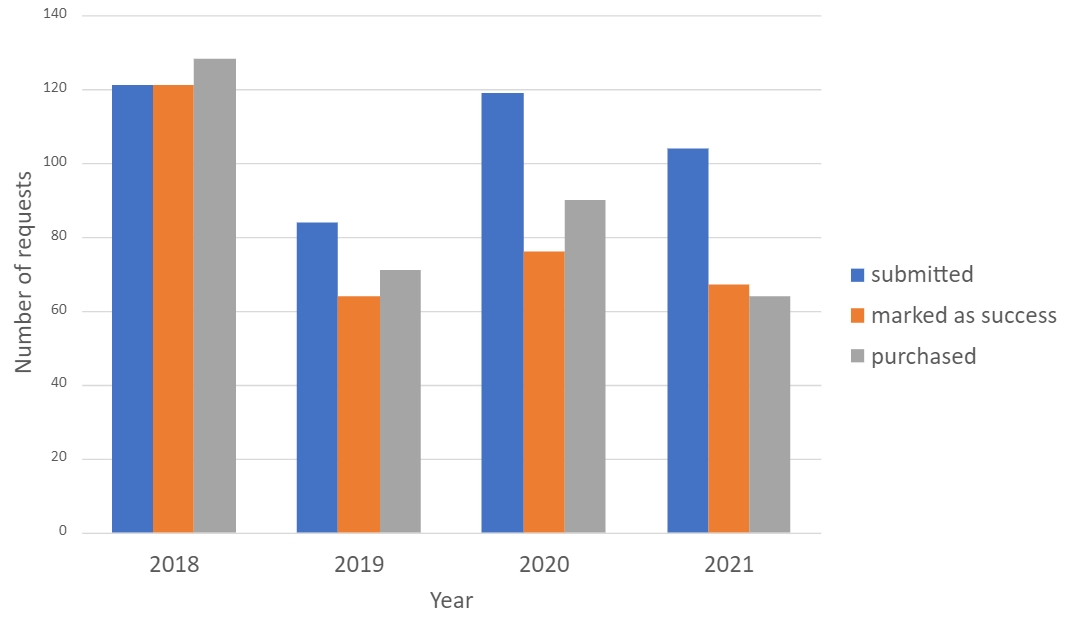
It should be noted the successful requests in Impala do not match the number of orders placed and received via acquisitions. On analysing the data, between 2018 and 2021 a total of 40 requests could not be purchased and was therefore correctly marked unsuccessful.
The remaining 60 failed requests can solely be attributed to overdue delivery runtimes of ordered titles, even when purchased via online vendors. This means a part of the outstanding POD-ILL requests in Impala expired before the title was delivered to the library. The library staff had to resubmit these requests a second or even third time.
It is notable that each year, the number of purchased titles is higher than the successfully handled POD-ILL requests. A proportion of ILL requests marked as failed were in fact successful, but expired without resubmitting the request a second time. Given that the patron receives an automated e-mail concerning the successful or failed submission of their ILL request, ILL staff should be aware of the discrepancies in communications. In this regard, the workflow needs further tweaking.
Furthermore, we can see the number of submitted POD-ILL requests by library staff is generally on the low side. Further analysis is needed to determine if this is caused by an unwillingness or inattentiveness to implement POD-ILL or if there simply are few requests that fit the parameters.
Requesting patrons
As Figure 2 shows, 148 unique patrons have placed at least one ILL request that resulted in a purchase through POD-ILL. All patrons so far have been university staff members. The parameter that facilitates purchases for students in some cases may need further promotion.
A little over 50% of individual patrons placed an ILL request that resulted in one delivered POD-ILL. Only 12 patrons have submitted ILL requests that resulted in five to nine purchases and four staff members have discovered the benefits of requesting via ILL and benefited from 10 or more purchases.
Apart from these 16 patrons, we see no large excesses in POD-ILL for certain patrons. Further analysis of the purchased titles for these ‘big requesters’ is needed, to determine if the titles are considered niche. If so, it might be better to decline the requests and advise them to purchase via their own research budget.
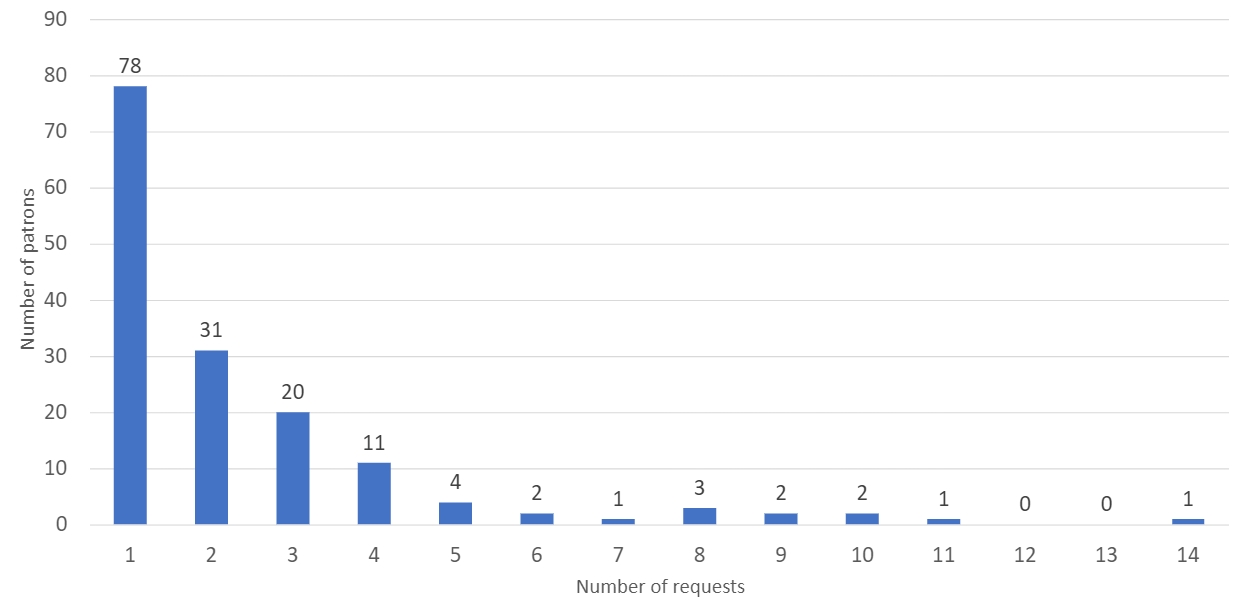
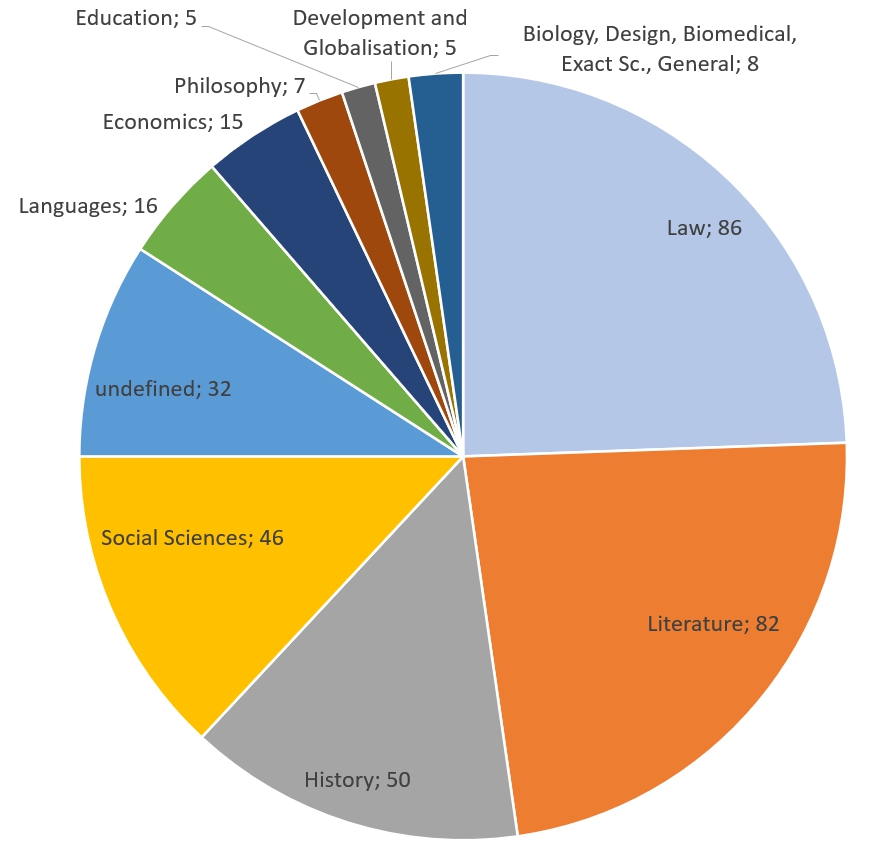
As expected, the vast majority of purchases was made for the faculties or departments of Law, Literature, History and Social Sciences (Anderson et al., 2002, p. 3). Unfortunately, there is quite a large portion of ‘undefined’ requests that were not labelled with the appropriate cluster. A preliminary analysis of these titles however supports the overall conclusion stated above. Titles for Exact and Biomedical Sciences are rarely purchased. These findings are not surprising and are in line with our expectations. These research fields are more article oriented and online document delivery largely suffices for these disciplines (Fig. 3).
Loan after purchase
From the 352 POD-ILL titles purchased about 7% was surprisingly never lent out. Our own ILL staff assesses the submitted ILL requests and checks if they comply with the parameters for purchase through POD-ILL. This might result in undesirable purchases. We did receive feedback from some patrons that in quite a few cases the delivery runtime was too high and the requester no longer required the title for research.
Luckily though, 93% of all POD-ILL purchases was lent out at least once and half of those were lent out from two up to 22 (!) times (Fig. 4). These loan numbers even exclude renewals, so loan could actually be even higher.
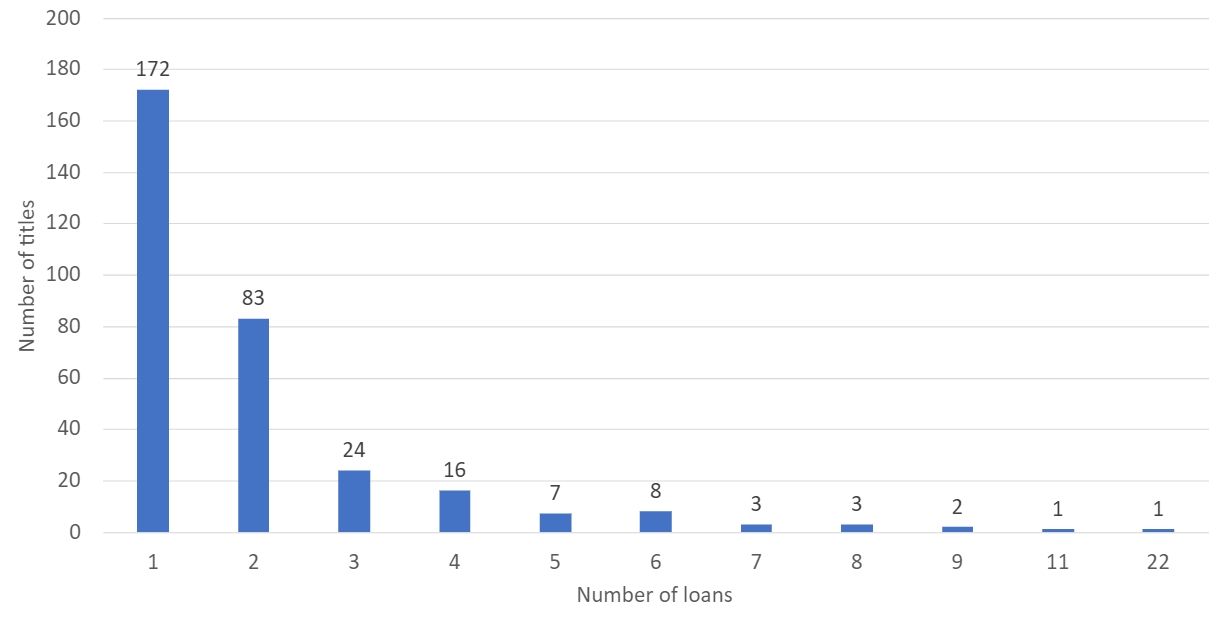
Vendors
In defining our pilot project as a means to quickly purchase and deliver ILL, we meant to acquire through online vendors such as Amazon and Bol.com. The library has a credit card for online purchases of publications. The financial department splits the amount of the monthly credit card bill between the different individual orders (and individual budgets).
No less than 70% of all purchases was in fact directly placed with Amazon (.fr, .de, .nl or .co.uk). We aimed to order within European borders as much as possible. All remaining orders delivered via other vendors were also purchased through Amazon. The largest suppliers after Amazon were The Book Depository, Bol.com and Dietmar Dreier. A myriad of small sellers delivered the remaining 49 requests (Fig. 5). With some exceptions, purchases are faster than ILL deliveries.
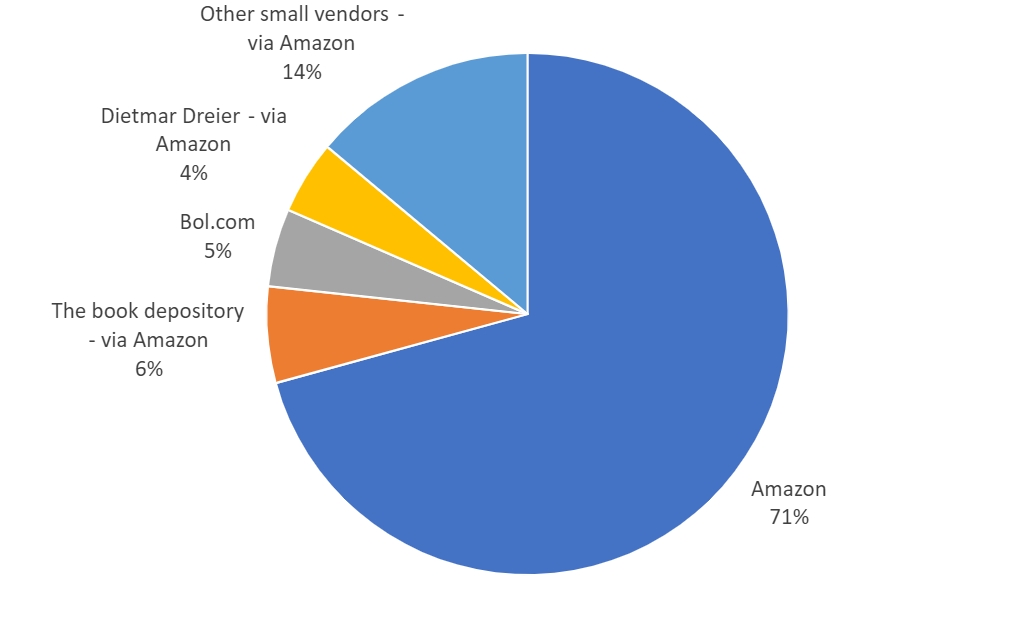
Evaluation
Patron feedback
We have held no quantitative or qualitative survey, so feedback has mostly been garnered through e-mail or orally at the service desk. Patron feedback we have received has been positive to extremely positive. Only one or two patrons have complained about their ILL fee, seeing as the material was purchased and normally purchase is billed via the faculty acquisition budget. Our POD-ILL viewpoint concerning costs however still stands: the title would never have been purchased if it weren’t for the ILL request. If we hadn’t purchased the item, the patron would still have paid the due fee for a regular ILL or even more, if costs for delivery were exuberant. Thanks to POD-ILL however, the patron pays for swift delivery after purchase, with the added bonus of being able to lend the item for as long as needed.
Staff perception
The staff perception is also largely positive, though some are hesitant to consider purchase because of a high amount of acquisitions for one or several departments or indeed faculty staff members. It would appear however that ILL staff are also hesitant to purchase due to prolonged delivery runtimes. This was not an issue we thought we would face. In some instances, it is still preferable to order international ILL in the Netherlands, Germany or German speaking Switzerland due to a short delivery runtime and relatively low ILL and postal costs. We have established clear terms of delivery through OCLC WorldShare ILL with Dutch research and university libraries. For our German-speaking neighbours, it’s fairly easy and cost-efficient to order through Subito.
ILL staff are still however satisfied to be able to order titles that are more difficult or costly to obtain via ILL. Removing the parameter of only ordering for faculty staff was celebrated by our ILL staff, though we rarely see a purchase for students being submitted via POD-ILL.
Library managers’ perception
Our Library managers clearly see the benefits of POD-ILL. The proposed annual budget is more than sufficient to cover the cost of the purchases, and we can guarantee satisfied patrons while moderately supplementing the collection with required literature. We annually discuss the POD-ILL numbers, and in 2021 the library managers even discussed the continuation of the project as a whole. All were in favour of keeping the project on as an additional acquisition model that should not be called into question again, provided the yearly budget remains sufficient to cover the cost.
Conclusion
As expected, most POD-ILL purchases are made for the disciplines Law, Literature, Social Sciences and History. These are the faculties and departments that already invest most heavily in collection development concerning monographs. These researchers generally place more ILL request, which in turn result in more POD-ILL. We have no indication that the POD-ILL system is being misused to divert purchasing and acquisition costs. The yearly allotted budget is more than sufficient to support POD-ILL. A few researchers will be made aware they are better served purchasing certain titles on their own research budget.
Staff members are thankful the requested title is included in the collection and therefore available for research without much restriction. Only a few patrons have contested the ILL fee, even though the purchase was made only due to their initial ILL request. Although we order through big online vendors to ensure quick delivery time, the delivery runtime is way below expectations.
The purchased titles are deemed appropriate and reflect the collection, though they do sometimes represent niche research. The orders mostly fit the preset parameters. These parameters can easily be adjusted, based on new emerging needs. As some faculties and departments are less preoccupied with collection development, we’ve expanded our parameters to include urgent ILL requests placed by students for mandatory reading. This expansion of the parameters hasn’t really borne results yet, so staff must be made aware of this possibility again.
The administration concerning POD-ILL does not require much additional staffing time. The workflow could be improved with an automated integration between our ILL and acquisition software. This would require extensive development of Impala, which does not yield enough benefit. Our current workflow is a required work-around that serves its purpose nicely though.
In our experience POD-ILL is a perfectly adequate service for our university staff and students.
Bibliography
Alder, N. L. (2008). Direct purchase as a function of interlibrary loan: Buying books versus borrowing. Journal of Interlibrary Loan, Document Delivery & Electronic Reserve, 18(1), 9–15. https://doi.org/10.1300/J474v18n01_03
Anderson, K. J., Freeman, R. S., Hérubel, J.-P. V. M., Mykytiuk, L. J., Nixon, J. M., & Ward, S. M. (2003). Buy, Don’t borrow: Bibliographers’ analysis of academic library collection development through interlibrary loan requests. Collection Management, 27(3–4), 1–11. https://doi.org/10.1300/J105v27n03_01
Chan, G. R. Y. C. (2004). Purchase instead of borrow: An international perspective. Journal of Interlibrary Loan, Document Delivery & Information Supply, 14(4), 23–37. https://doi.org/10.1300/J110v14n04_03
Foss, M. (2008). Books-on-demand pilot program: An innovative “patron-centric” approach to enhance the library collection. Journal of Access Services, 5(1–2), 305–315. https://doi.org/10.1080/15367960802199117
Gee, C. W. (2014). Book-buying through interlibrary loan: Analysis of the first eight years at a large public university library. Journal of Interlibrary Loan, Document Delivery and Electronic Reserve, 24(5), 133–145. https://doi.org/10.1080/1072303X.2015.1018473
Hostetler, M. (2010). Purchase-on-demand: An overview of the literature. Against the Grain, 22(2). https://doi.org/10.7771/2380-176X.5505
Imamoto, B., & Mackinder, L. (2016). Neither beg, borrow, nor steal: Purchasing interlibrary loan requests at an academic library. Technical Services Quarterly, 33(4), 371–385. https://doi.org/10.1080/07317131.2016.1203642
Tyler, D. C. (2011). Patron-driven purchase on demand programs for printed books and similar materials: A chronological review and summary of findings. Library Philosophy and Practice (e-journal), (6). https://digitalcommons.unl.edu/libphilprac/635
Tyler, D. C., Melvin, J. C., Epp, M., & Kreps, A. M. (2014a). Don’t fear the reader: Librarian versus interlibrary loan patron-driven acquisition of print books at an academic library by relative collecting level and by Library of Congress classes and subclasses. College and Research Libraries, 75(5), 684–704. https://doi.org/10.5860/crl.75.5.684
Tyler, D. C., Melvin, J. C., Epp, M., & Kreps, A. M. (2014b). Patron-driven acquisition and monopolistic use: Are patrons at academic libraries using library funds to effectively build private collections? Library Philosophy and Practice (e-journal). http://digitalcommons.unl.edu/libphilprac/1149
Tyler, D. C., Melvin, J. C., Xu, Y., Epp, M., & Kreps, A. M. (2011). Effective selectors? Interlibrary loan patrons as monograph purchasers: A comparative examination of price and circulation-related performance. Journal of Interlibrary Loan, Document Delivery and Electronic Reserve, 21(1–2), 57–90. https://doi.org/10.1080/1072303X.2011.557322
Tyler, D. C., Xu, Y., Melvin, J. C., Epp, M., & Kreps, A. M. (2010). Just how right are the customers? An analysis of the relative performance of patron-initiated interlibrary loan monograph purchases. Collection Management, 35(3-4), 162–179. https://doi.org/10.1080/01462679.2010.487030
Ward, S. M., Wray, T., & Debus-López, K. E. (2003). Collection development based on patron requests: Collaboration between interlibrary loan and acquisitions. Library Collections, Acquisition and Technical Services, 27(2), 203–213. https://doi.org/10.1016/S1464-9055(03)00051-4
Ward, S. M. (2002). Books on demand: Just-in-time acquisitions.The Acquisitions Librarian, 14(27), 95-107. https://doi.org/10.1300/J101v14n27_12
Zopfi-Jordan, D. (2008). Purchasing or borrowing: Making interlibrary loan decisions that enhance patron satisfaction. Journal of Interlibrary Loan, Document Delivery and Electronic Reserve, 18(3), 387–394. https://doi.org/10.1080/10723030802186447
- Impala, Belgian ILL system: https://anet.be/doc/impala/impalae/html/index.html ↵

